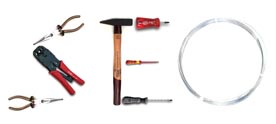One of the most frequent types of post I see on Fourth Source and similar websites are those giving practical tips aimed towards beginners or the ‘DIY’ segment; small business owners attempting to optimise their own website. Despite having read some excellent posts on this topic, I’ve always held a strong reservation about whether this would be successful, and wanted to start a discussion around whether it’s really possible in 2011.
I can understand the requirement for DIY SEO – many small and growing businesses simply can’t afford an agency on a retainer – especially when coupled with the reality that SEO can take time to deliver. It is also too often the case that small businesses are often given a poor level of service when dealing with bigger agencies that focus most of their attention (at least with respect to the senior staff) on the bigger brands. Although this might seem to be a straightforward issue of Agency selection I’ve seen smaller businesses in the past pay a huge amount (relative to what they can afford) to an agency who merely plug them into a link network and do very little else – clearly in this case it could easily be argued that the business owner would be better off on their own.
So while there’s an obvious need for many businesses, where DIY SEO can breakdown is in the complexity that needs to be appreciated in competitive SEO. For instance, in a recent excellent post on Econsultancy, Kevin puts together a great list of tips for beginners, and while they are all useful, it’s easy to see how the list would generate more questions for the beginner than answers. For instance, it’s a great tip to setup an XML sitemap, but which pages should be included? What priority should be set? Is a multi-tiered sitemap approach appropriate? I can guarantee contradictory advice could be found online for all of the above questions. This leaves the business owner with the difficult choice of either choosing which advice to follow, going with their gut instinct or simply ignoring the areas they don’t understand altogether.
There’s then the other problem of activity – SEO isn’t a one off process, and results in competitive sectors are extremely unlikely without a substantial amount of effort into link building, content and social media on an ongoing basis. While a business committed to online can happily put aside a couple of days to optimise the code of the website, it’s a different commitment entirely to ensure that frequent content is uploaded and shared socially. Would this still get done if the business had an important deal to seal that week, or a member of staff was off sick? From my experience the likelihood is fairly low, with most businesses losing interest after a few months.
Last but not least, there is the issue of competency – there can be little doubt that the knowledge and experience that a professional SEO can bring will achieve a better result than an enthusiastic DIY-er. Competitive sectors require more than just best practise; despite the number of books that claim to make you an expert SEO, simple logic dictates that it’s not possible. If you take a phrase like “online poker”, a first page ranking can be worth millions – if SEO could be learned from a book, then everyone who read the book would rank 1st for major keywords like these – if only there wasn’t just a single #1 spot. Just as a great chef will tell you, cooking great cuisine is a lot more than just buying a good recipe book.
So this brings me to the question of when DIY SEO is appropriate – is there any place at all for it? despite my reservations I can see some situations where DIY SEO can be the most effective way to achieve one’s goals. Where the requirement for SEO is not business critical (for instance, a ‘brochure’ website where most business will come through WOM referrals), and the sector is not competitive, a DIY approach to SEO is probably sufficient to achieve some decent traction without risking too much. Other situations where DIY SEO is more achievable can occur where the industry revolves around content production already (for instance publishing) – it’s easier to learn how to adjust what you are already doing than learning from scratch.
For those businesses who are thinking about doing their own SEO, I’d urge to ask yourself the following 5 questions:
1) Can I afford to hire somebody with more experience and knowledge to do a better job?
2) Is it important to my business that I rank well in search engines?
3) Do I have the time to learn SEO, and am I willing to wait until I’m ready?
4) Can I make a long term commitment to continue the activity, even as I become busier with other matters?
5) Can I adjust some of the things I’m already doing, or is it all going to be new to me?
Answering the above 5 questions will usually be enough to make it clear whether DIY is the right approach or not, but what about when it’s not clear? Sometimes it’s obvious that DIY isn’t applicable, but the funds aren’t there to hire an agency on retainer. In this case I’d recommend buying some consulting time (either from an agency or consultant) with the objective of completing one-off work and getting in place the right processes to succeed.
Despite my obvious bias in concluding this (I work for a digital agency), I really do think DIY SEO is rarely the best route, and that it can often do more harm than good. I believe that if more smaller businesses turned around the ‘Can I really afford SEO?’ to ‘Can I afford not be easily found by my potential customers?’ they would probably conclude the same.






